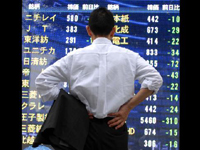Japan's Nikkei drops nearly 2 % caused by U.S. falling jobs
Japan's Nikkei 225 Stock Average fell to the lowest in more than two years after falling jobs in the U.S. and the strengthening yen raised concerns about profit earned in Japan's biggest export market.

Sony Corp., which gets a quarter of its electronics sales from the U.S., sank to the lowest in more than two years, while Nissan Motor Co. declined to a level not seen in five years. Power producers rose as investors sought companies perceived to be relatively unaffected by a weaker economy.
"The expectation that emerging countries will offset a rapid slowdown in the U.S. economy has receded,'' said Takanori Tanabe, head of Tokyo-based fund management company Tanabe Economic Research Institute. "Investors are buying stocks that are insulated from economic news here and overseas, and they're shy to invest in exporters because of the rising yen.''
The Nikkei 225 Stock Average dropped 250.67, or 2 percent, to close at 12,532.13 in Tokyo, the lowest since Sept. 1, 2005. The broader Topix idex lost 23.38, or 1.9 percent, to 1,224.39. About five companies fell for each that gained on the benchmark.
U.S. payrolls fell the most in five years, the Labor Department said on March 7, after economists predicted an increase. The dollar traded as low as 101.98 yen in Tokyo , the lowest since January 2000. A weaker dollar cuts the value of repatriated profit from the U.S. for overseas companies.
Sony, the world's second-biggest maker of consumer electronics, tumbled 5 percent to 4,380 yen, the lowest since December 2005.Nissan, which gets 44 percent of its operating profit from North America, dived 3.6 percent to 863 yen, the weakest since April 2003.Toyota Motor Corp., Japan's biggest carmaker, slid 2.4 percent to 5,200 yen.
A 1 yen change against the dollar affects Sony's operating profit by 6 billion yen ($59 million) a year, the company said.
The Nikkei had a correlation of 0.93 with the yen in the past six months. A value of one would mean the two always rise and fall in tandem.
Sumitomo Metal Mining Co., Japan's biggest gold producer, plummeted 11 percent to 1,989 yen, leading a decline in the Topix Nonferrous Metals Index. Gold for April delivery retreated to as low as $972.00 an ounce from a record $995.20 on March 5.
Fidelity Investments Japan Ltd. cut its stake in the metals company to 3.74 percent from 6.25 percent, according to a filing to Japan 's finance ministry on March 7.
Tokyo Electric Power Co., Asia's largest utility, jumped 2.5 percent to 2,630 yen, while smaller rival Kansai Electric Power Co. added 3.4 percent to 2,615 yen. The Topix Electric Power & Gas Index advanced 2.8 percent, leading four gainers among the 33 industry groups on the benchmark.
Nikkei225 is a stock market index for the Tokyo Stock Exchange. The Nikkei average is the most watched index of Asian stocks. It has been calculated daily by the Nihon Keizai Shimbun (Nikkei) newspaper since 1971. It is a price-weighted average (the unit is Yen), and the components are reviewed once a year.
The Nikkei 225 began to be calculated on September 7, 1950 , retroactively calculated back to May 16, 1949 .
The Nikkei 225 Futures, introduced at the Osaka Securities Exchange, Chicago Mercantile Exchange, Singapore Exchange, is now an internationally recognized futures index.
The Nikkei average hit its all-time high on December 29, 1989 when it reached an intra-day high of 38,957.44 before closing at 38,915.87. Its high for the 21st century stands just above 18,300 points.
Another major index for the Tokyo Stock Exchange is the Topix.
Subscribe to Pravda.Ru Telegram channel, Facebook, RSS!





